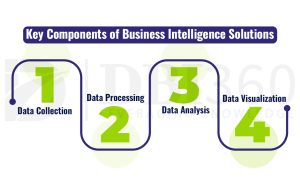In the dynamic landscape of modern business, staying ahead requires more than just intuition – it demands informed decision-making based on accurate insights. This is where Business Intelligence solutions come into play. For beginners navigating the vast realm of business intelligence (BI), this guide breaks down the basics, unraveling business intelligence’s purpose, features, and contributions to data-driven business decision-making.
What is Business Intelligence?
At its core, Business Intelligence refers to the technologies, processes, and tools that help businesses gather, analyze, and visualize data to derive actionable insights. Business Intelligence empowers organizations to transform raw data into meaningful information, fostering smarter strategic decisions.
Key Components
-
Data Collection: Business Intelligence solutions gather data from various sources, including internal databases, external databases, and even real-time data streams.
-
Data Processing: Once collected, data undergoes processing to cleanse, organize, and structure it for analysis. This step ensures that decision-makers work with accurate and reliable information.

-
Data Analysis: Business Intelligence tools employ advanced analytics to dissect data, identifying trends, patterns, and correlations. This step unveils the story hidden within the data.
-
Data Visualization: Transforming complex data into comprehensible visuals, such as charts, graphs, and dashboards, facilitates more straightforward interpretation for decision-makers.
Features of BI Solutions:
-
Reporting: Business Intelligence software generates detailed reports, offering a snapshot of key performance indicators (KPIs) and facilitating a comprehensive view of business performance.
-
Dashboarding: Dashboards provide a real-time overview of critical metrics, allowing for quick assessments and immediate responses to emerging trends.
-
Ad Hoc Queries: Users can create ad hoc queries to explore data on-demand, enabling flexibility in exploring specific areas of interest.
-
Predictive Analytics: Business intelligence systems often incorporate predictive analytics, forecasting future trends based on historical data.
Contributions to Data-Driven Decision-Making:
-
Informed Decision-Making: Business Intelligence ensures decision-makers access accurate and timely information, reducing reliance on guesswork.
-
Identifying Opportunities and Risks: Analyzing trends helps identify new business opportunities while recognizing potential risks early on.
-
Improved Operational Efficiency: By streamlining data processes, business intelligence solutions enhance operational efficiency, saving time and resources.
-
Enhanced Customer Experience: Understanding customer behavior through business intelligence allows businesses to tailor their strategies, ultimately improving customer satisfaction.
Getting Started with BI
For beginners, embracing BI involves understanding organizational needs, selecting suitable BI tools, and fostering a data-driven culture.
In conclusion, Business Intelligence is not just a tool – it’s a transformative force. Armed with the insights derived from Business intelligence solutions, businesses can navigate the complexities of today’s competitive landscape, making decisions that drive success and sustainability.

